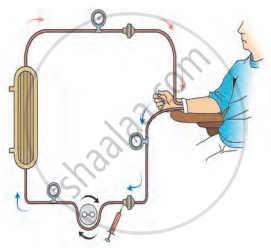Advertisements
Advertisements
Question
How are kidney stones formed?
Solution
Kidney stones are formed when crystal-forming substances such as calcium oxalate, calcium phosphate, and uric acid are more than the fluid in the urine. When these chemicals start sticking together, they form crystals, commonly called kidney stones. They may be formed and cause severe pain.
APPEARS IN
RELATED QUESTIONS
Correct the sequence of the following steps to explain the process of urine formation.
1. Blood enters the glomerulus under high pressure.
2. The filtrate passes through the thin walls of the Bowman’s capsule into the renal tubule
3. As the filtrate, passes through the tubule, water, and many useful substances are reabsorbed by the walls of the blood capillaries.
4. Water and small solutes are filtered in the Bowman’s capsule.
5. The remaining liquid, along with waste is called urine and is collected in the urinary bladder.
6. Blood containing waste material enters the kidneys through the renal artery.
Answer the following question.
Doctors say Mr. Shaikh is suffering from urolithiasis. How it could be explained in simple words?
Complete the diagram/chart with correct labels/ information. Write the conceptual details regarding it.

Excretion of uric acid includes the following features EXCEPT ______
Haemodialysis is done in the condition when the person is suffering from ______.
Match the abnormal conditions given in Column A with their explanations given in Column B and Choose the correct option
| Column A | Column B |
| A. Glycosuria | i. Accumulation of uric acid in joints |
| B. Renal calculi | ii. Inflammation in glomeruli |
| C. Glomerular nephritis | iii. Mass of crystallised salts within the kidney |
| D. Gout | iv. Presence of glucose in urine |
What is the procedure advised for the correction of extreme renal failure? Give a brief account of it.
Which type of kidney stones are formed due to genetic disorders?
Renal calculi is ______.
Which statement is correct regarding the haemodialysis procedure?
